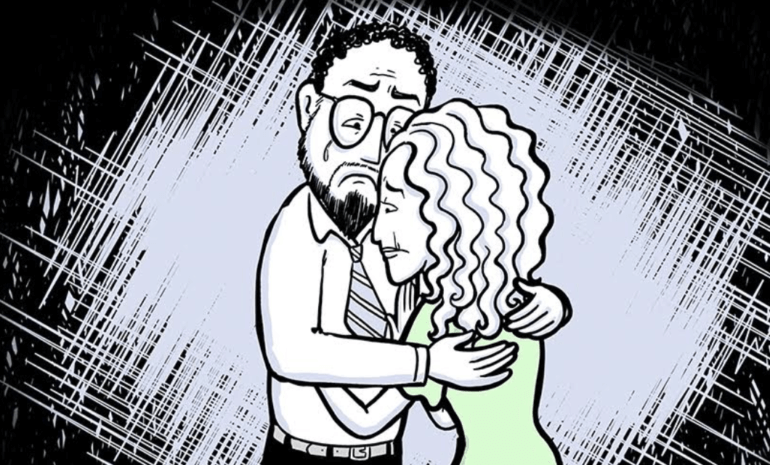
This Orthodox Jewish Man Is Trying To Normalize Men Discussing The Pain of A Miscarriage
Ten years. Ten years is a long time. They say ‘time heals all wounds’ and ‘whatever doesn’t kill you makes you stronger,’ but I think those phrases need to be updated. Because while time dulls the pain, it doesn’t heal wounds that aren’t fully treated.
Ten years ago last month, my wife and I experienced a loss that still affects us to this day: a miscarriage we were unprepared for.
To preface this, we are now incredibly fortunate to (B” H) have three wonderful children. When the miscarriage happened, my wife Chari and I had already had our eldest child, Jakey. His pregnancy and delivery had gone off without a hitch. Young and healthy, we never considered that a future pregnancy might end in anything other than another child, which is why we were caught so off-guard when the second pregnancy didn’t go as planned.
BOY it did not go as planned. Not only was it sudden, but I was also out of town acting as the only chaperone for about 15 teenage boys. I had to be ‘on’ the entire time and couldn’t fall to pieces, no matter how much I wanted to crawl into bed and be left alone to process what we had lost.
Despite not being a baby yet, we dreamt about what the future would look like for them and us.
Will he look like me? Will she love sports? What special thing will they bring to the world? So when a miscarriage suddenly happens, what do you do with those hopes and dreams? Do you mourn for them?
From a Jewish perspective, it’s a complicated topic. We don’t sit shiva nor get to deal with the emotions in that setting. While we rightfully focus on the mother who’s physically (and mentally) dealing with the miscarriage, often the husband’s mental health is not considered. It feels selfish for us to talk about our emotions and how it affected us when often our wives are in pain and suffering in ways we will never understand.
Still, it is important for our mental health to discuss our feelings as husband and wife (or partners) during and after what is a pretty traumatic experience. Not only does it help bond you during a difficult time, it helps to get those feelings out. Speaking to friends and a therapist can also be helpful. Otherwise, It can be an isolating experience.
Personally, I withdrew and distracted myself from what had happened instead of dealing with it head on. The only time I really let my guard down was when I got back from the trip and could be with my wife.
I finally cried for the first time. After that one time, though, I didn’t know how to process things. I’m not much of a communicator to begin with, which is ironic given my job as a voice actor. I didn’t know how to talk to others about it because as far as I knew, none of my friends had gone through the experience.
I occupied myself with work, social media, and video games to ignore the pain and sadness. It started to seriously affect my family and relationships with my friends. Even with my little boy, the one person who would cheer me up.
Ultimately, I had to pull myself out of the funk I was in. I started to talk more with my wife and friends. It still hurt, but it helped to know that people were there for me. I also learned how many friends had the same experience or something similar.
Learning it was more common than I’d thought helped me to know I wasn’t alone. My wife and I learned how to discuss difficult topics and express our emotions. We were both hurting and we learned how to cope with it together.
Because my wife is an animator, one way we worked out our feelings was by creating a comic about our experience called Miscarried, which I helped to write and edit. It was released, shared by Mayim Bialik, and was well received.
After being contacted by a reader, we created a new comic, focusing on the husband’s perspective, called Michael’s Miscarriage. In the comic, the husband, Michael, is a psychologist. In it, he is keenly aware of his wife’s mental health during their pregnancy, but he did not deal with his own emotions.
Mental health and pregnancy loss can be taboo subjects in general. There is a sense that for Orthodox Jews they are even more taboo. Our goal with the Unspoken animated shorts series is to make subjects like pregnancy loss and mental health more accessible and less taboo for people everywhere. We want to normalize these challenges so that people don’t feel isolated; so that they feel like their experiences are shared and seen. As Chari says in the conclusion of first short: “The more we talk about things, the less scary they become. Nobody should be suffering alone.”
June is Men’s Mental Health Awareness Month. In honor of that, we’ve released Unspoken: Michael’s Miscarriage, a short based on the experience of Michael, a psychologist, who turns inward instead of expressing himself to his wife and friends. It was definitely a piece that resonated strongly with me. With my wife using her cartooning, writing, editing and producing skills, and me using my writing, acting and directing skills, it was wonderful to collaborate and take something tragic, and create something that we hope will help others cope with their losses as well. And though it happened ten years ago, this creative endeavor has also helped us to heal.
Our goal with the “Unspoken” animated shorts series is to make subjects like these more accessible and less taboo for people todiscuss. As Chari says in the conclusion of first short: “The more we talk about things, the less scary they become. Nobody should be suffering alone.”
If you found this content meaningful and want to help further our mission through our Keter, Makom, and Tikun branches, please consider becoming a Change Maker today.







